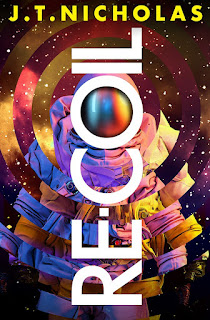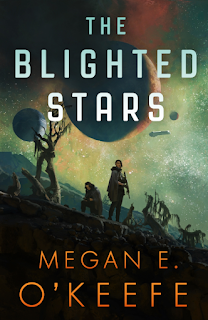This week we’re talking about one of my favorite subjects—let’s talk about books!
It never fails to blow my mind when a writer mentions they don’t read. Maybe you’re one of them. But I firmly believe, and will continue to say, that reading will improve your own writing.
Yes, you can take classes and get degrees that will teach you how to write. But if you don’t read and absorb emotions from the page, it’s like following a recipe step by step but never stopping to taste what your cooking.
Back to my favorite topic! Books! I write both fantasy and science fiction, and though I read basically all genres (sorry gridmark, you’re a touch too dark for me) I glom SFF reads. Recently I’ve devoured some excellent sci-fi! So, let me gush:
Re-Coil by J.T. Nicholas
Out on a salvage mission with a skeleton crew, Carter Langston is murdered by animated corpses left behind on this ship. Yet in this future, everyone’s consciousness backup can be safely downloaded into a brand-new body, and all you’d lose are the memories of what happened between your last backup and your death. But when Langston wakes up in his new body, he is immediately attacked in the medbay and has to fight once again for his life—and his immortality. Because this assassin aims to destroy his core forever.
Determined to find his shipmates and solve this evolving mystery, Langston locates their tech whiz Shay Chan, but two members are missing and perhaps permanently killed. Langston and Chan are soon running for their lives with the assassin and the corporation behind him in hot pursuit.
What Langston and Chan ultimately find would signal the end of humanity. What started as a salvage mission just might end up saving the world.
This futuristic, as opposed to near-future, sci-fi plays off the idea of our souls consisting of the neural pathways that we’ve been able to contain on a computer chip and when you die, you can be re-coiled into a new body.
There’s quite a bit of repetition in describing how different people mentally handle being re-coiled into various bodies. Some readers/writers go the repetitive route, some, like me, avoid it. To each their own. But the plot line is tight, intriguing, and the emotional connection between Langston and his former crew mate is intense.
I highly suggest this if you’re in the mood for a sci-fi with a heavy dose of mystery, tension, and a nice romance sub-plot.
The Blighted Stars by Megan E. O’Keefe
When a spy is stranded on a dead planet with her mortal enemy, she must first figure out how to survive before she can uncover the conspiracy that landed them both there in the first place.
She’s a revolutionary. Humanity is running out of options. Habitable planets are being destroyed as quickly as they’re found and Naira Sharp knows the reason why. The all-powerful Mercator family has been controlling the exploration of the universe for decades, and exploiting any materials they find along the way under the guise of helping humanity’s expansion. But Naira knows the truth, and she plans to bring the whole family down from the inside.
He’s the heir to the dynasty. Tarquin Mercator never wanted to run a galaxy-spanning business empire. He just wanted to study rocks and read books. But Tarquin’s father has tasked him with monitoring the mining of a new planet, and he doesn’t really have a choice in the matter.
Disguised as Tarquin’s new bodyguard, Naira plans to destroy his ship before it lands. But neither of them expects to end up stranded on a dead planet. To survive and keep her secret, Naira will have to join forces with the man she’s sworn to hate. And together they will uncover a plot that’s bigger than both of them.
This sci-fi follows off the same theory that our souls can be downloaded into new bodies, making us near immortal. And it’s immortality that’s driving a dirty hunt for an element that will enable us to live even longer.
Filled with political intrigue, undercover spies, a young scientist, and tangled emotions, The Blighted Stars is a fantastic other-world read!
I know, the second blurb was short. They’re both fantastic reads, I’m just running out of time. I need to catch a plane! And yes, I’ve packed two paperback books and have two queued up on my kindle….I hope I don’t run out of things to read!
What are you reading this week?












